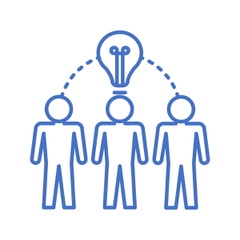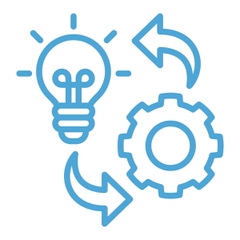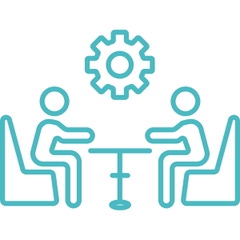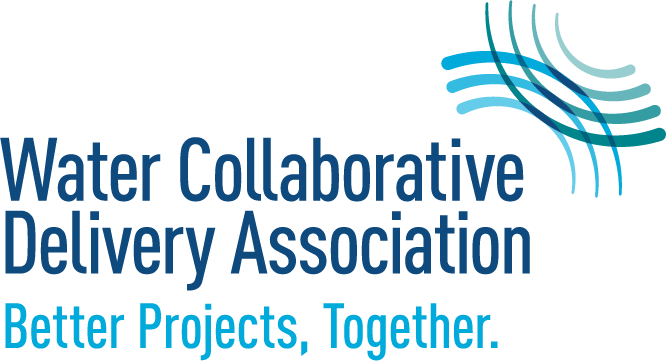Education Programs
Empowering the industry with essential knowledge.
Our education sessions are designed to empower owners, government officials, and practitioners with proven best practices for planning, procuring, delivering, and managing collaborative delivery projects in the water and wastewater sector. Taught by some of the nation’s leading water design-build and CMAR experts, our industry-aligned experiential workshops blend essential knowledge with practical application to ensure that attendees leave prepared to collaborate successfully, lead change, and achieve successful project outcomes.
WCDA offers three distinct collaborative delivery education tracks, encompassing the full spectrum of delivery methods, from CMAR through progressive and fixed-price design-build.

Fundamentals starts with how to select a delivery method, covering the attributes of the full spectrum of delivery methods, an overview of risk and commercial issues, and procurement and selection.

Implementation starts at project kick-off and focuses on every aspect of successful project delivery, covering Phase 1 preconstruction through Phase 2 construction warranty CMAR and progressive design-build.

Risk Allocation & Contracts starts with a strategic deep dive on equitable risk allocation to “get to the table” and then using contracting approaches specific to W/WW treatment and conveyance projects.
WCDA Education Sessions are Offered in Two Formats:
Customized Classroom Sessions
By-the-Seat Webinars
Current Course Information and Registration
CURRICULUM CONTENT
Three Tracks:
1. Fundamentals of Collaborative Delivery
This series integrates content from our new 6th edition Water and Wastewater Collaborative Delivery Handbook with specific needs and interests identified from our research with utility/agency decision makers and project, procurement, legal, and operations managers whose goal is to deliver successful collaborative delivery projects. All participants receive the handbook as part of the curriculum along with other pertinent materials.
Who should attend: Leadership, project managers, and procurement specialists from any entity considering the use of any collaborative delivery method; practitioners and owner advisors interested in all aspects of collaborative delivery for water and wastewater projects.
Is Collaborative Delivery Right for Your Project?
This material is based on Chapter 1 of the WCDA handbook. It provides overall guidance to owners and practitioners on the structured decision-making process required to build understanding and consensus about a project’s goals, priorities, and desired outcomes. The material also provides a checklist of other factors that may impact a delivery method decision, including organizational policies, state statutes, and the potential benefits of equitable risk allocation.
Making Sense of Collaborative Delivery Options
This material is based on Chapter 2 of the WCDA handbook. It provides the definition of the collaborative delivery spectrum and then provides a deeper description of the primary delivery methods in turn: construction management at-risk (aka CM/GC or GC/CM), progressive design-build, and fixed-price design-build—defining the similarities and differences among them. This material is summarized with an overall comparison of each of the common delivery methods, highlighting their relative attributes.
Understanding and Allocating Risks
This material is based on Chapter 3 of the WCDA handbook. It addresses the fundamental difference in risk allocation between traditional DBB and CMAR as compared to design-build, quantified as deliverable-based versus performance-based contracting.
Understanding Contracts
This material is based on Chapter 4 of the WCDA handbook. It presents key contract commercial and legal concepts that mirror traditional construction practice, but are implemented in a new way for collaborative delivery. This material emphasizes commercial concepts and business practices that are unique to two-phase collaborative delivery contracts such as CMAR and progressive design-build.
Emphasizing the Importance of O&M Engagement
This material is based on Chapter 5 of the WCDA handbook. It reinforces the need and timing for O&M participation in collaborative delivery from the outset of project definition and design through construction. It reinforces the critical importance of well-defined performance criteria and the role of Acceptance for design-build projects.
Preparing and Supporting a Project for Procurement
This material is based on Chapter 6 of the WCDA handbook. It addresses the strategic steps that owners and owner advisors should use to prepare in advance of a collaborative delivery procurement. It focuses on the methodical development of a Procurement Implementation Plan.
Implementing a Best-Value Procurement Process
This material is based on Chapter 7 of the WCDA handbook. It covers the implementation of common procurement processes and timelines for each collaborative delivery method, with emphasis on the meaning of best value and performance-based versus prescriptive requirements.
2. Implementing Collaborative Delivery
This series covers content from the second half of the 6th edition Water and Wastewater Collaborative Delivery Handbook, focusing on specific activities for delivery two-phase collaborative delivery projects after the selection of a CMAR or design-builder.
Who should attend: Leadership, project managers, and construction managers from any entity that is about to embark on—or is in the midst of—a collaborative delivery project; practitioners and owner advisors supporting projects postprocurement.
Foundations of Project Success
This material is based on Chapter 8 of the WCDA handbook. It addresses the strategy and tactics for setting a collaborate delivery project off on a path most likely to lead to project success, including partnering.
Phase 1 Design and Preconstruction
This material is based on Chapter 9 of the WCDA handbook. It covers key activities that occur during the design and preconstruction phase including establishing an estimate format, evaluating early work package proposals, and assessing costs being submitted to an owner by a CMAR or design-builder.
Getting to a Contract Price
This material is based on Chapter 10 of the WCDA handbook. It covers the key activities required to achieve an agreed-upon project cost and price and then transition to the construction phase.
Construction Implementation
This material is based on Chapter 12 of the WCDA handbook. It focuses on key construction phase activities, including how construction management differs between CMAR and design-build, tracking project costs, transition to O&M, and implementing and validating design-build performance requirements.
Project Completion
This material is based on Chapter 13 of the WCDA handbook. It defines the meaning behind substantial and final completion and supports a detailed discussion on post-completion performance requirements, including warranties, performance guarantees, and statutes of repose.
3. Risk Allocation and Contracts
This series provides a deep dive on equitable risk allocation for design-build, expanding on the 6th edition Water and Wastewater Collaborative Delivery Handbook material to further define the meaning of standard of care and performance risk in the context of common water- and wastewater-focused contract terms, funding compliance requirements, and available contract forms.
Who should attend: Leadership, attorneys, and senior procurement professionals from any entity that is considering adapting its risk allocation and contracts for collaborative delivery projects; outside counsel and owner advisors supporting collaborative delivery contracting
Defining Standard of Care and Performance-Based Requirements
Expanding on Chapter 3 of the WCDA handbook, this material provides a deep-dive definition of standard of care and how it differs from the performance-based requirements often encountered in a design-build implementation.
Following the Risk Road Map
Expanding on Chapters 3 and 4 of the WCDA handbook, this material dives deeper into the shift in risk allocation as projects move from traditional design-bid-build and CMAR delivery to the realm of design-build.
Mapping Business Decisions Against Legal Requirements
Expanding on Chapter 4 of the WCDA handbook, this material focuses on how many common contract terms may be interpreted and implemented differently through the risk allocation lens of design-build, with an emphasis on understanding the difference between applicable legal requirements and business decisions.
Funding Source Requirements
Expanding on Chapters 1and 6 of the WCDA handbook, this material provides specific guidance on how various funding entities’ requirements may require specific implementation strategies for CMAR and design-build projects, particularly for design reviews and cost tracking.
Available Contract Forms
Expanding on Chapter 4 of the WCDA handbook, this material identifies the differences among the commonly available contract forms from WCDA, DBIA, EJCDC, and others.
Session Instructors
Our instructors are industry experts with first-hand knowledge and experience in successfully accomplishing collaborative delivery water infrastructure projects.
- Retired WCDA Executive Director Mark E. Alpert, PE, FDBIA
- WCDA Assistant Director | Education Director Leofwin Clark
Cost and Arrangements
Contact WCDA Business Operations Manager Bob Golden, CAE, RCE
Mobile: 303-641-0550
email: RGolden@WaterCollaborativeDelivery.org
or Education@WaterCollaborativeDelivery.org
“As both a contractor and an engineer, I learned a tremendous amount at the design-build SRF education workshop. My only hope is that eventually all of our municipal clients would sit through this course. Project delivery should be a win for the customer, the engineer, and the contractor and I truly believe that qualifications-based selection, versus ‘low bid,’ ensures that this happens.”
Spencer Tuell, PE
President, Gulf Coast Underground, LLC
